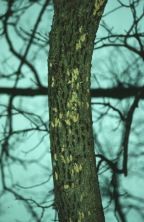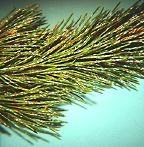Winter plant care reduces springtime pest problems, say Cornell Plantations experts
By H. Roger Segelken
Although hard-working gardeners look forward to the end of another growing season, a few precautions during the winter months will make plants healthier in the spring, according to experts at Cornell Plantations.
"Before you hang up your gardening tools and turn your attention indoors, remember that an ounce of pest control now can prevent serious problems later," says Donna Levy, the pest-management coordinator at Cornell Plantations. "Now is a great time to deal with leaves that may harbor insects and diseases and to prune and scout your landscape during the winter months to combat the pests that plague your plants."
Based on her experience in protecting thousands of plants on more than 200 acres s of Cornell Plantations, Levy has the following advice:
- Because many fungi and insects over-winter on fallen leaves, gardeners can reduce the incidence of next year's ugly leaf spots and blotches by removing and destroying -- or in many cases, composting -- those leaves.
- For plants prone to fungal leaf diseases, pruning will help improve air circulation. Winter is a good time for pruning since a plant's structure is more obvious when the leaves are gone. Fireblight, a bacterial disease that infects plants in the rose family, should be pruned out annually. Trimming the tips of boxwoods every few years can keep boxwood psyllid eggs from hatching in spring. Be sure to remove all prunings from the site.
- Winter also is a good time to forecast some of next year's pest problems. On hardwoods, gypsy moth egg masses are evident on the trunks and undersides of branches. Look for elongated white specks on pine needles; these are over-wintering pine-needle scales. Also, a new pest called the viburnum leaf beetle was busy inserting its eggs into viburnum twigs last fall. Although it may not be possible to prevent outbreaks of these insects, gardeners can plan pest-control strategy for next spring.
"Visit your trees and shrubs this winter," Levy suggests. "And make good use of your rake, pruning shears and your eyes while you're out there. "
The botanical gardens, arboretum and natural areas of Cornell Plantations are open free of charge to the public during daylight hours. For more information on Cornell Plantations, stop by the Garden Gift Shop, call (607) 255-3020 or visit the Plantations Web site at http://www.plantations.cornell.edu
Media Contact
Get Cornell news delivered right to your inbox.
Subscribe
